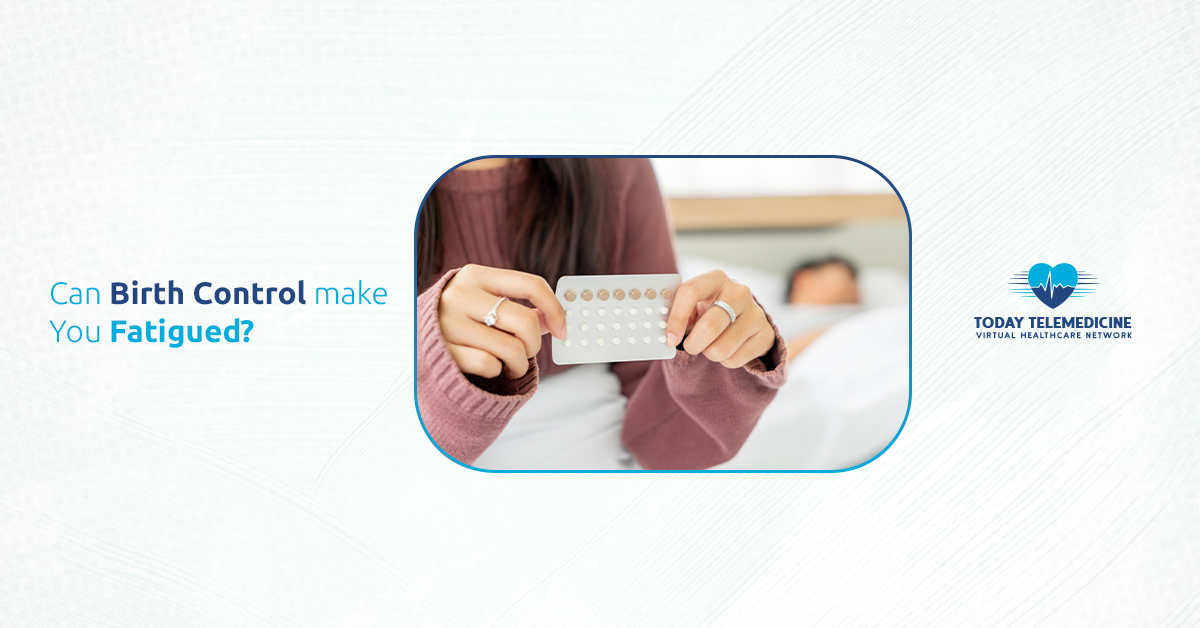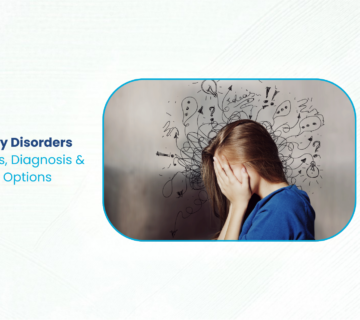Many people wonder, “Can birth control make you fatigued?” Many people ask this question. Energy levels can shift dramatically when hormonal methods enter or exit your life. We will explain how birth control affects your energy. We’ll examine why these changes happen and provide tips to boost your energy. Let’s begin!
Are you struggling with fatigue from birth control? Today Telemedicine experts can help. We’ll find the cause and create solutions to increase your energy. Contact us today.
What Causes Birth Control Fatigue?
Birth control methods such as pills, patches, IUDs, and implants affect your hormones. They mainly use estrogen and progestin to prevent pregnancy. Yet, these hormones can also stir your emotions. For some, this results in “birth control tiredness” or “hormonal exhaustion.”
Hormones act as messengers. They tell your body what to do. Your body needs time to adjust when new hormones come in or when it gets rid of old ones. The transition stage might cause you to become exhausted.
Why Do Some People Feel Tired on Birth Control?
The explanation changes depending on the individual. So, what does science say?
- Hormonal Changes: Essential hormone levels of estrogen and progestin disrupt your metabolic system, sleep patterns, and mood regulation.
- Body Stress: Initiating or halting birth control demands a significant adjustment. Your body may expend extra energy to adapt.
- Personal Sensitivity: Some individuals feel hormonal shifts more acutely than others.
Wondering, “Will birth control make you tired?” The reality is this: it could, but not everyone feels fatigued.
Common Signs of Hormonal Exhaustion
Hormonal exhaustion isn’t just regular tiredness. It can feel like:
- Tiredness sticks around, even after sleeping well.
- Focus blurs, causing brain fog.
- Mood swings come and go, often irritating.
- There is little motivation for daily tasks.
Symptoms often show up in the first few months of using hormonal birth control. For instance, many report feeling “fatigue after IUD insertion.” This happens as the body gets used to the new device that releases hormones.
Birth Control and Insomnia: A Surprising Link
Did you know that birth control can play tricks on your sleep? For some, the connection between birth control and insomnia is all too real. Progestin can disrupt your sleep cycle. It’s tough to get to sleep and keep sleeping. Poor sleep quality produces daytime drowsiness that starts a tireless cycle.
Talk to your doctor if you have sleep troubles after starting birth control. They may suggest changing methods or adjusting your dose timing.
Fatigue after Stopping Birth Control: What’s Happening?
Halting birth control can be as tiring as starting it. Feeling drained is a typical response. It’s simply your body reorienting itself, rediscovering its natural rhythm. This hormonal return may take weeks or even months. It relies on how extensively you’ve relied on hormonal methods.
Types of Birth Control More Likely to Cause Fatigue
Not all birth control methods affect energy the same way. Here’s a speedy comparison:
- Pills and patches deliver substantial hormone doses. This can lead to noticeable fatigue.
- Hormonal IUDs provide a constant flow of hormones. Still, some individuals experience fatigue after they are inserted.
- Non-hormonal options like copper IUDs and condoms don’t use hormones. This can help reduce fatigue.
Contact your healthcare provider for non-hormonal contraception when you experience fatigue.
How Long Does Birth Control Fatigue Last?
Birth control fatigue is a common side effect. It usually goes away in three to six months. This occurs as your body finds its footing. Yet, if that fatigue trudges on, the method might be mismatched for you.
Take, for instance, “fatigue after stopping birth control.” It often slips away as hormone levels regain their balance. If you feel sluggish for over six months, consider getting a check-up. The decision will benefit your bodily well-being.
When to Talk to a Doctor about Fatigue
Feeling tired during hormone changes is expected. Yet, some warning signs mean it’s time to get help:
- Fatigue that affects your daily life (like missing work or school).
- Problematic sleep quality caused by birth control methods turns one into an exhausted person.
- Symptoms include dizziness, rapid weight reduction, and chest pain.
A doctor checks for anemia and other health issues.
6 Ways to Manage Birth Control-Related Fatigue
- Chart Your Symptoms: Keep a diary of fatigue’s comings and goings. Jot down when it strikes, how long it lingers, and what lifts your spirits. Patterns often reveal themselves in these notes.
- Revise Your Meal Plan: Spinach and beans with eggs and fish increase energy. They are rich in iron and vitamin B12.
- Stay Active: Light exercises like walking or yoga improve your energy and mood.
- Hydrate Well: Drink 6–8 glasses of water daily. Dehydration can lead to fatigue.
- Prioritize Sleep: Establish a relaxing bedtime routine. Avoid monitors, caffeine, and heavy food before bed.
- Ask about Changing Methods: If you keep feeling tired, keep in mind a decreased dose or a non-hormonal delivery method.
Myths about Birth Control and Fatigue
Let’s clear up misunderstandings:
Myth: “All birth control causes fatigue.”
Truth: Only some people experience this side effect.
Myth: “Fatigue means something’s seriously wrong.”
Truth: It’s usually temporary, but always check with a doctor if you’re worried.
Final Thoughts: Your Health Comes First
So, can birth control make you fatigued? The answer is yes for some, but it’s often manageable. If you are feeling tired from birth control, hormonal changes, or an IUD, keep these points in mind:
- Listen to your body.
- Track symptoms and talk openly with your doctor.
- Give adjustments a while, but don’t turn away from other alternatives.
You deserve to experience vibrant and proper—don’t settle for whatever is much less!
FAQs
Can birth control make you fatigued even years after starting it?
It’s rare. Most people adjust within months. Long-term fatigue could mean your method needs revisiting.
Does hormonal exhaustion affect mental health?
Yes—fatigue can worsen stress or anxiety. Don’t hesitate to seek support.
Is fatigue after stopping birth control normal?
Yes! Your body is recalibrating. Give it time, and stay hydrated and rested.





